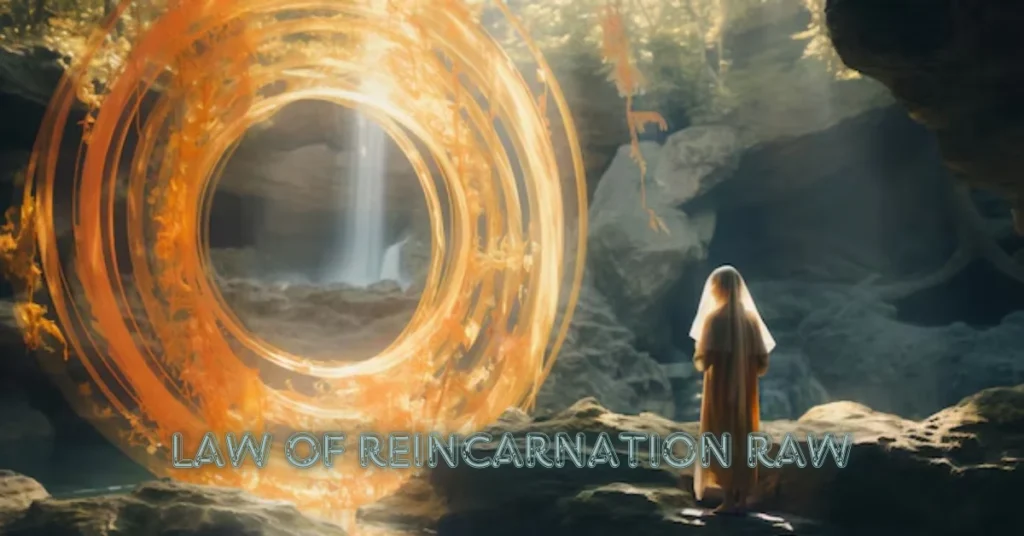Introduction to the Law of Reincarnation
The concept of reincarnation has captivated minds for centuries, weaving its way through ancient texts and spiritual teachings. Imagine a journey where your soul transcends time and space, experiencing life after life in an endless cycle of growth and learning. This is the essence of the law of reincarnation raw—a fascinating exploration into the depths of existence itself.
As we dive deeper into this profound topic, we’ll unravel its history, understand how karma shapes our journeys, and explore various beliefs surrounding rebirth. Whether you’re a skeptic or a firm believer, there’s something intriguing about considering what lies beyond this physical realm. Join us on this enlightening adventure as we peel back the layers that obscure our understanding of the soul’s true purpose.
History and Origins of the Concept
The concept of reincarnation has ancient roots, tracing back thousands of years. It appears in various cultures and religions, each adding its unique twist to the idea.
In Hinduism, reincarnation is linked to the cycle of birth, death, and rebirth known as samsara. This belief emphasizes that the soul undergoes multiple lives until it achieves liberation or moksha.
Buddhism also embraces a similar notion but focuses more on the impermanence of life. Here, reincarnation serves as part of the path toward enlightenment.
Ancient Egyptian beliefs featured fascinating ideas about the afterlife too. They viewed death as a transition rather than an end and held rituals aimed at ensuring safe passage for souls into new realms.
Greek philosophers like Plato explored these themes further. Their reflections laid foundational thoughts on immortality and transmutation of souls across lifetimes.
Understanding the Soul’s Journey
The soul’s journey is a profound exploration of existence. It transcends the physical realm and delves into experiences accumulated over lifetimes. Each life presents lessons, challenges, and opportunities for growth.
As souls reincarnate, they carry fragments of past memories and emotions. This continuity shapes their decisions in new lives. The intricate tapestry woven through various incarnations offers depth to personal evolution.
Understanding this journey requires an open heart and mind. Embracing the idea that each life serves a purpose can shift perspectives on struggles faced today.
Moreover, recognizing that we are all interconnected fosters compassion for others on similar paths. Every individual is navigating their unique experience while contributing to the collective story of humanity.
In essence, the soul’s journey invites reflection on who we are beyond mere physicality—opening doors to deeper understanding and wisdom.
The Role of Karma in Reincarnation
Karma serves as a crucial thread woven into the fabric of reincarnation. It embodies the principle that our actions directly influence our future experiences, not just in this life but across lifetimes.
Every choice we make generates energy. Good deeds cultivate positive karma, leading to favorable circumstances in subsequent incarnations. Conversely, harmful actions can result in challenges and suffering.
This cyclical process encourages personal growth and spiritual evolution. Each experience becomes an opportunity for learning and transformation.
As souls navigate through various lives, they carry the weight of their past choices. The journey is not random; it’s meticulously designed by karmic laws that promote balance and justice.
Understanding karma invites deeper reflection on how our current behavior shapes tomorrow’s reality. This awareness prompts conscious decision-making, allowing individuals to break negative patterns and embrace a path towards enlightenment.
Evidence and Research on Reincarnation
Many researchers have delved into the phenomenon of reincarnation, presenting fascinating cases that challenge our understanding of life and death. One notable figure is Dr. Ian Stevenson, a psychiatrist who dedicated decades to studying children claiming to remember past lives.
His investigations uncovered remarkable details from young individuals, often recounting specific names, places, or events they couldn’t possibly know. These accounts prompted rigorous analysis and sparked discussions in both scientific and spiritual communities.
Additionally, studies conducted across various cultures reveal similar patterns in beliefs about past lives. The consistency of these experiences raises questions about consciousness and its potential survival beyond physical existence.
Recent advancements in neuroscience also explore how memories might transcend lifetimes. Researchers are increasingly interested in the intersection between science and spirituality when examining such extraordinary claims related to the law of reincarnation raw.
Different Beliefs and Perspectives on Reincarnation
Reincarnation is a concept embraced by various cultures and religions, each adding its own unique flavor. In Hinduism, the cycle of birth, death, and rebirth—samsara—is central to spiritual growth. The ultimate goal? Achieving moksha or liberation from this cycle.
Buddhism offers a slightly different view. Here, reincarnation isn’t about returning as the same self but rather as part of an ongoing process influenced by karma. It emphasizes impermanence and interconnectedness.
In Western traditions like Spiritualism and certain New Age beliefs, reincarnation often serves as a means for personal evolution. They see it as an opportunity to learn lessons across multiple lifetimes.
Interestingly, some skeptics argue against the concept entirely. They point to scientific evidence that challenges claims of past lives or memories resurfacing in present times. This rich tapestry of beliefs highlights how diverse human perspectives can be on life’s mysteries.
How to Connect with Past Lives
Connecting with past lives can be a fascinating journey into the depths of your soul. Start by cultivating mindfulness through meditation. This practice allows you to quiet the mind and tap into deeper layers of consciousness.
Journaling is another powerful tool. Write down dreams or memories that feel vivid or out of place. These might be clues from previous existences, waiting to be uncovered.
Exploring hypnosis can also provide access to these hidden realms. A trained practitioner can guide you through experiences that reveal fragments of your past.
Additionally, consider working with crystals known for their connection to ancestral wisdom, such as lapis lazuli or amethyst.
Intuitive practices like tarot reading may offer insights into patterns shaped over lifetimes. Trusting your intuition will lead you closer to understanding who you’ve been before this life started.
Practical Applications of Understanding Reincarnation
Understanding reincarnation can profoundly impact personal growth and healing. When we recognize that our souls have lived multiple lives, it encourages a more compassionate view of ourselves and others. This perspective fosters forgiveness and patience.
Individuals often find empowerment in exploring past life experiences. Techniques like regression therapy allow people to uncover insights from former existences that influence their current behavior and relationships.
Additionally, embracing the concept of karma helps guide daily decision-making. Knowing that actions ripple through lifetimes can motivate ethical choices today, enhancing overall well-being.
Meditation practices focused on past life exploration also serve as tools for self-discovery. By tapping into deeper aspects of consciousness, individuals may unlock lessons meant to be learned in this lifetime.
The raw understanding of reincarnation enriches one’s spiritual journey while promoting holistic healing across many dimensions of life.
Controversies and Criticisms Surrounding the Law of Reincarnation
The law of reincarnation raw has sparked significant debate among scholars, spiritual leaders, and skeptics alike. Critics argue that the concept lacks empirical evidence. They question its validity and whether it can stand up to scientific scrutiny.
Many point out that anecdotal accounts of past life memories are often dismissed as flawed recollections or fabrications. Psychological explanations for these experiences abound, suggesting they stem from imagination rather than genuine past-life recollection.
Religious perspectives also create tension around the idea of reincarnation. Some faiths firmly believe in a singular life journey leading to eternal judgment, while others embrace cyclical rebirths.
These differing views raise profound questions about morality and existence itself. If we live multiple lives filled with different lessons and experiences, what does that mean for accountability? The discussions surrounding this complex topic continue to evolve as more people explore their beliefs regarding the soul’s ultimate path.
Conclusion
The journey through the law of reincarnation raw is a fascinating exploration of life, death, and what lies beyond. It invites us to ponder the depths of our existence and the potential for growth that each lifetime brings.
As we reflect on historical beliefs and contemporary understandings, it becomes clear that this concept transcends cultural boundaries. The interplay between karma and reincarnation emphasizes personal responsibility in shaping our destinies.
Engaging with past lives can provide insight into current challenges, offering tools for healing and transformation. Yet, like any significant theme in spirituality, it also faces scrutiny from skeptics who question its validity.
Embracing this rich tapestry allows us to connect more deeply with ourselves while broadening our understanding of human experience. Whether viewed through philosophical lenses or spiritual practices, the law of reincarnation remains an enduring topic worthy of exploration.
Your perspective on life may shift as you delve into these mysteries; ultimately leading you closer to your own truth about existence and purpose.
FAQs
What is “Law of Reincarnation Raw”?
The “Law of Reincarnation Raw” explores the concept of reincarnation, focusing on the raw, fundamental aspects of how the soul is believed to reincarnate through different lifetimes. It delves into the historical, spiritual, and philosophical dimensions of reincarnation, aiming to provide a deep understanding of the soul’s journey and the role of karma in shaping future lives.
How does the law of reincarnation relate to karma?
Karma is integral to the law of reincarnation, serving as the principle that our actions in one life influence our experiences in future lives. Positive actions build good karma, leading to favorable circumstances, while negative actions result in challenges. This cyclical process encourages personal growth and spiritual evolution across lifetimes.
What historical cultures have contributed to the concept of reincarnation?
Reincarnation has roots in various ancient cultures, including Hinduism, which views it as a cycle of birth, death, and rebirth until achieving liberation (moksha). Buddhism incorporates reincarnation as part of the path to enlightenment, focusing on impermanence. Ancient Egyptian beliefs and Greek philosophers also explored similar ideas about the afterlife and soul’s journey.
How can one connect with past lives?
Connecting with past lives can be approached through several methods: mindfulness meditation to access deeper consciousness, journaling to capture vivid dreams or memories, and hypnosis for guided exploration. Additionally, using crystals linked to ancestral wisdom or engaging in intuitive practices like tarot reading may provide insights into past life experiences.
What are some criticisms of the law of reincarnation?
Critics argue that the law of reincarnation lacks empirical evidence and often dismiss anecdotal past life memories as psychological phenomena rather than genuine recollections. Some religious perspectives also oppose reincarnation, favoring a singular life journey leading to eternal judgment instead. These criticisms continue to fuel debate about the validity and implications of reincarnation.







